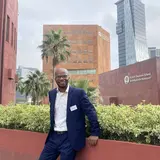
From Constructing Roads to Strategizing AI at a Student-Led Conference
Ash Duong ’25, co-president of the Yale SOM AI Association, reflects on his role co-hosting the second annual Yale Responsible AI in Global Business Conference.
Two years ago, if you’d told me I’d be co-hosting and emceeing the largest AI conference at Yale, I likely would have laughed. My background is in civil engineering, working on infrastructure projects that are seemingly worlds away from algorithms and technology. Yet, my first-generation, low-income background sharpened my awareness of how new technologies can either democratize opportunity or widen existing gaps. When I arrived at SOM, this knowledge motivated me to take cross-disciplinary AI courses, spend too much money on AI tools, and learn to vibe code. Beyond making AI accessible for myself, I focused on a broader question: how can people from diverse backgrounds help shape AI’s future, rather than simply adapting to changes designed without their input?
The AI Association was founded in spring 2024 by Christian Avila ’24, Jack Xuhui Zhang ’24, and Joseph Bronner ’24. I carried the torch as co-president this past fall, leading the club through events that demystified AI tools and discussed their implications for sectors from consulting to healthcare. While organizing these discussions, it became clear how this technology was reshaping business strategy, policy discussions, and the very nature of work. Yet, many conversations felt siloed. We saw a pressing need at Yale SOM—dedicated to educating leaders for business and society—to create dialogue that embraces AI’s complexity through a multi-stakeholder lens, with a focus on responsible adoption and human-centered values.
That need drove our team’s vision as we hosted the second annual Responsible AI in Global Business conference earlier this April. Our goal was to build bridges, convening diverse perspectives often left out of the mainstream AI discourse. We forged a unique partnership model, bringing the student-led AI Association together with the Yale Program on Stakeholder Innovation and Management and the Data & Trust Alliance, alongside crucial university collaborators from the Provost’s Office, the Schmidt Program at the Yale Jackson School of Global Affairs, and the Digital Ethics Center. This event convened over 900 attendees (400+ in person, 500+ virtually), including faculty, students, alumni, industry leaders, technologists, and policymakers. The Provost’s support enabled free access for Yale community members as part of the university’s broader $150 million initiative to advance AI leadership.
As co-host and emcee, watching these perspectives converge was incredibly powerful. A consistent theme was the importance of adaptable skills over specific degrees. Navigating the AI-driven future requires critical thinking, communication, ethical reasoning, and collaboration alongside technical literacy—a message relevant to my own transition and many fellow MBAs.
Beyond skills development, a recurring concern across panels was the necessity to build public trust in AI systems, underscoring that responsible AI adoption isn’t just about access but also about fostering confidence through transparency, education, and governance.


While the formal panels provided structured insights, the hallway conversations proved equally valuable. I saw attendees chatting with executives including Sarah Bird (Microsoft), Jim Swanson (Johnson & Johnson), Connecticut Senator James Maroney, and Traci Hughes (formerly SAP), all of whom stayed for most of the conference. These spontaneous encounters highlighted a shared desire to learn from one another, regardless of background or seniority.
John Maeda’s passionate calls for empathy in AI were another highlight. The technologist and Microsoft executive reminded us that tech should ultimately serve human needs and enhance human experience. That perspective felt like a vital anchor amidst rapid innovation, sparking thoughtful questions about user trust and inclusive design.
Furthermore, questions and conversations about AI’s impact on jobs were consistent throughout the day. According to our feedback survey, the “Designing a New Workforce” panel tied for the most valuable session by addressing attendees’ real career anxieties and echoing the need for developing new skills. The panel brought together unique perspectives on work in the age of AI: Amanda Ballantyne, a tech-focused organizer with the AFL-CIO; Seeyew Mo, a former assistant director at the Office of National Cyber Director; Yale professor and CNBC contributor Joanne Lipman, and former SAP executive Traci Hughes.




Co-chairing this conference alongside Rui Li ’25 and Chloe Lei ’25, and working with our incredible student team (Gigi Hsu ’26, Nico Sahi ’26, Jackson School of Global Affairs student Dan Kent, and 22 others) reinforced the power of student leadership. The conference demonstrated that we, as students, can play a significant role in shaping the dialogue on campus and beyond. If AI is shaping everyone’s future, then everyone deserves a voice in how it’s built and deployed.
The 2025 Yale Responsible AI in Global Business conference was a testament to the power of collaboration and the importance of bringing diverse voices together to navigate the age of AI responsibly. My journey from construction to co-hosting this conference taught me that engaging with AI isn’t reserved for technical experts. I urge my fellow SOM classmates, broader Yale students, and industry leaders—whatever your background—to lean into this space. Attend all the AI events, experiment with AI tools, participate in the dialogues, and find your voice. As current and future leaders, we have a unique opportunity and responsibility to shape an AI future where innovation drives empathy, trust, and human value.



